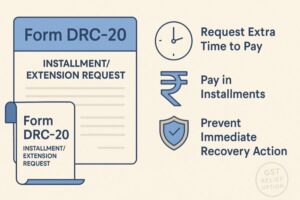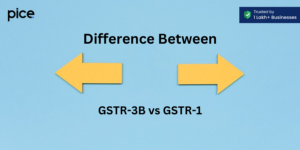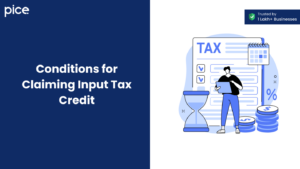Person not liable for Registration Under GST Section 23
- 15 Apr 25
- 10 mins
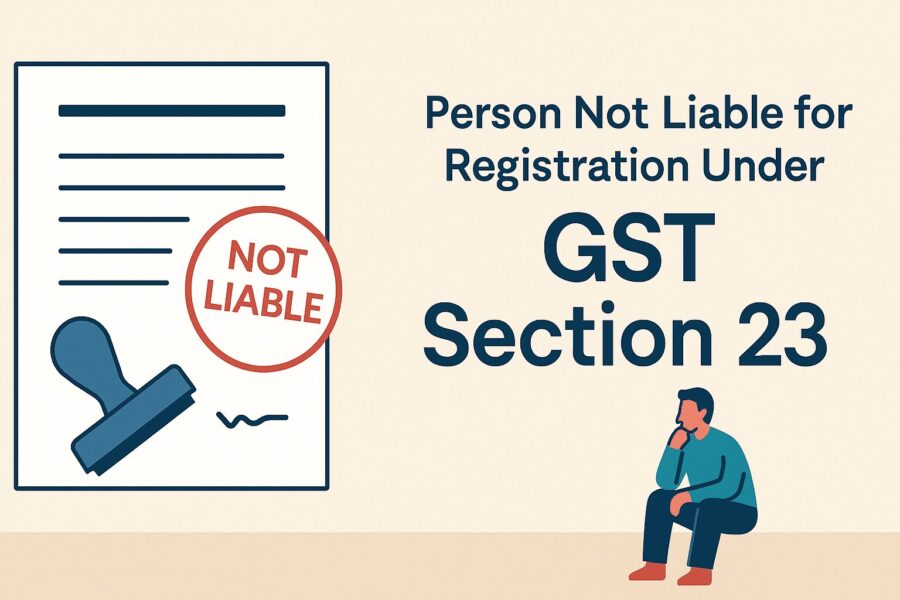
Person not liable for Registration Under GST Section 23
Key Takeaways
- Section 23 exempts businesses with only exempt supplies.
- Farmers selling own produce exempt from GST registration.
- Reverse charge suppliers don’t need GST registration.
- Interstate job workers and handicraft sellers under threshold exempted.
- Financial services must follow GST rules to avoid liabilities.
The Goods and Services Tax (GST) is a comprehensive, destination-based indirect tax system implemented in India from July 1, 2017. While the GST regime mandates most businesses and individuals engaged in the supply of goods or services to register under its provisions, there are specific exemptions carved out under Section 23 of the Central Goods and Services Tax (CGST) Act, 2017.
These exemptions outline scenarios where there is a special category of businesses and persons not liable for registration under GST section 23. Knowing Section 23 is crucial for taxpayers and professionals alike, as it provides clarity on whether GST registration requirements is necessary based on the nature and scope of the activities being undertaken.
Keep reading this blog for more details about registration under GST law Section 23.
The Nature of Section 22 Under the GST Act
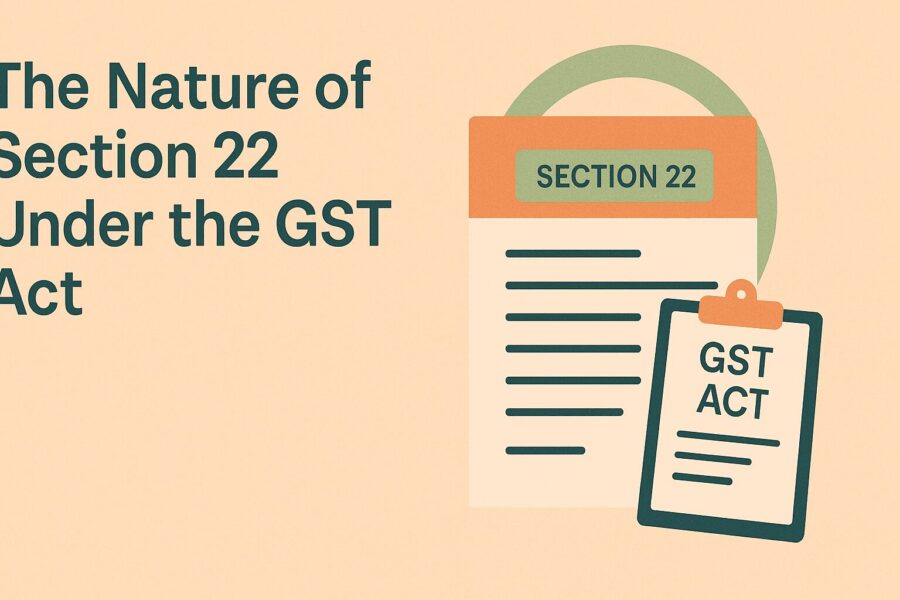
As per Section 22, any supplier engaged in the taxable supply of products, services, or both must opt for GST registration if their aggregate revenue surpasses Rs. 20 lakhs in a financial year. However, for the suppliers who only deal with goods, this GST registration threshold has been increased to Rs. 40 lakhs, effective April 1, 2019.
In contrast, businesses located in special category states are subject to a lower registration threshold, which is Rs. 10 lakhs. It is crucial to understand that the regulations outlined in Section 23 of the CGST Act, 2017, take precedence over those outlined in Section 22.
This implies that if there is any conflict between these two sections, the provisions mentioned in Section 23 will hold greater authority and must be followed.
The Section 23 of the CGST Act, 2017
The provisions under Section 23 of the CGST Act 2017 define the criteria for determining whether a person is needed to register for GST.
1. Individuals or businesses that engage exclusively in supplying goods, services, or both are either non-taxable under the GST System or solely exempt from tax exemption from registration in the GST framework.
For example, according to Section 23 of the CGST Act 2017, a business that is involved only in the supply of alcohol for human consumption does not need to obtain GST registration even if its aggregate turnover is beyond Rs. 20 lakhs.
Section 22 of the CGST Act 2017 requires a business to register for GST if its total revenue exceeds Rs. 20 lakhs in a financial year, regardless of whether it includes taxable or exempt supplies.
On the contrary, Section 23 of CGST Act 2017, which takes precedence, grants an exemption from GST registration to businesses dealing exclusively in exempt or non-taxable supplies, even if their annual revenue surpasses Rs. 20 lakhs.
Therefore, persons or businesses engaged solely in exempt supplies must not apply for GST registration, even if the total yield exceeds Rs. 20 lakhs
2. An agriculturist and the person directly involved in cultivating land do not need to opt for GST registration for the supply of produce grown from their cultivation.
Under Section 2(7) of the CGST Act, the term "agriculturist" refers to a person or a Hindu Undivided Family (HUF) engaged in farming.
Cultivation can be done in three ways: (a) cultivation of land through personal labour, (b) taking the help of family members, or (c) hiring some efficient workers, either on wages paid in cash or kind, or hired workers under personal supervision or the supervision of a family member.
3. Based on the GST Council's recommendation, the CBIC can issue notifications to exempt specific categories from GST registration. The CBIC has released some notifications granting registration exemptions to various groups of people.
This suggests that the Central Board of Indirect Taxes and Customs (CBIC) has the authority to exempt certain persons from GST registration, but only after approval from the GST Council. These exemptions are notified through official government notifications. Such notifications help reduce the compliance burden for specific service providers or businesses with limited operations.
Tax Calculated Solely Under the Reverse Charge Framework
When a person is engaged exclusively in supplies on which tax is payable under the reverse charge mechanism (RCM), they are not required to obtain GST registration as per CBIC Notification No. 5/2017. In such cases, the liability to pay GST lies with the recipient of the goods or services, not the supplier.
Therefore, if a person’s entire outward supply attracts GST under RCM and they have no taxable supply of their own, they are exempt from registration under Section 23 of the CGST Act. This provision helps reduce compliance for those with only reverse charge transactions.
Interstate Transactions Carried Out by the Job Worker
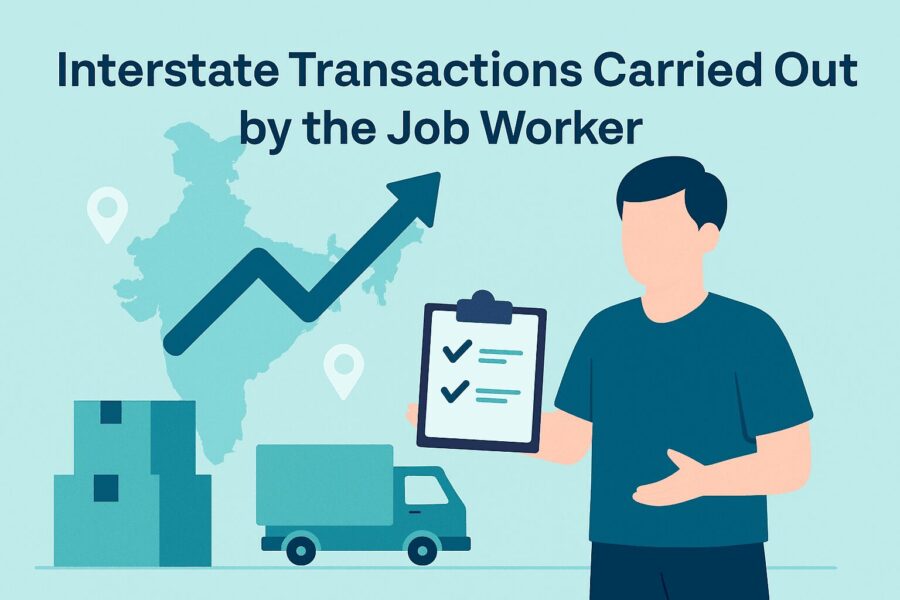
A worker engaged in inter-state supply under the job work services to a registered person does not need to obtain GST registration. However, this exemption does not apply to job workers in the jewellery business (including goldsmiths’ and silversmiths’ wares) or those who have voluntarily registered under GST. Additionally, registration becomes mandatory if their total annual turnover exceeds Rs. 20 lakhs.
Inter-state taxable Supply of Services
Initially, any person making inter-state taxable services was required to register under GST, regardless of aggregate turnove. However, as per Notification No. 10/2017, persons making inter-state taxable supply of services are exempt from registration if their aggregate turnover is below ₹20 lakhs (₹10 lakhs in special category states). This relaxation simplifies compliance for small service providers operating across state lines.
Services through an E-commerce Portal
Service providers who deal through an e-commerce operator or platform do not need to register under the GST system if their total cumulative revenue is below Rs. 20 lakhs per year (or Rs. 10 lakhs for certain category states).
Interstate Trade of Handicraft Products
Individuals involved in inter-state supplies of handicraft goods do not need to apply for GST registration. In addition, they do not require casual registration when selling handmade products outside the state where their business is based. However, this exemption applies, only if their total annual income stays within the threshold limit of Rs. 20 lakhs (Rs. 10 lakhs for particular category states).
Exclusive Supply of Goods
Businesses or individuals involved only in goods are not required to register for GST if their total annual revenue does not surpass Rs. 40 lakhs in a financial year.
Compulsory GST Registration and Its Impact on Financial Services
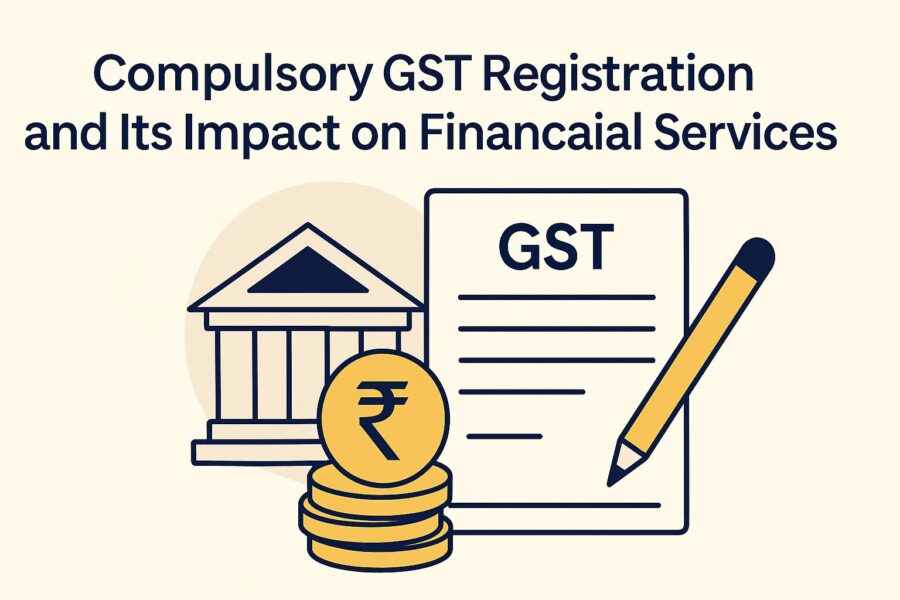
In India, compulsory GST registration is crucial for businesses and financial companies that meet the specified turnover threshold. Beyond traditional sectors, it also impacts Non-banking Financial Companies (NBFCs), share transactions, and financial services.
Understanding its role in Video KYC, the dematerialisation of shares, and duplicate share certificates will help ensure compliance and seamless operations.
- Impact of GST on NBFCs and Video KYC Compliance
Video KYC (Video Based Customer Identification Process) is a digital process that allows NBFCs to complete the entire KYC process remotely through video calls. This procedure removes the need for in-person verification.
Through Video KYC, loan approval processes are sped up. It also helps boost financial services like new account openings. It ensures fast customer onboarding by eliminating paperwork and making the verification process seamless.
The RBI mandates KYC compliance for financial entities, and Video KYC helps NBFCs meet these requirements efficiently. It not only removes the need for paperwork but also manual verification and physical visits. As NBFCs work through digital platforms, they may cross the GST registration threshold. This factor makes tax compliance essential for their operations.
- GST Implications on Share Transactions and Duplicate Share Certificates
Category of persons or businesses dealing in shares are required to understand GST regulations, especially for services related to share transfers, offering duplicate share certificates, or handling transactions with utmost security.
GST may apply to service charges taken by financial service providers assisting in acquiring duplicate share certificates. Under the GST system in India, these service charges may be taxed at the applicable rates. Businesses and investors using these services must consider this factor when estimating overall costs.
In addition, companies providing such services must apply for GST registration if their aggregate turnover surpasses the specified threshold.
- Shares Dematerialisation and GST Compliance
The dematerialisation of shares is substantial for trading seamlessly and adhering to regulatory compliance.
Financial entities facilitating dematerialisation services might attract GST on their service fees. It can make GST registration compulsory for establishments surpassing the annual turnover limit.
In general, "dematerialisation" simplifies trading by converting physical certificates into digital format. It not only ensures security but also makes the transfer process hassle-free. Investors can embrace faster transactions and eliminate risks of loss or forgery. Since financial service providers help in this procedure, they often charge service fees, which may be subject to GST.
Entities providing dematerialisation services must comply with GST regulations if their total income exceeds the specified limit. Comprehending GST regulations helps investors and businesses avoid unanticipated tax liabilities.
Conclusion
This blog is all about businesses and persons who fall under exemption from registration under GST Section 23 of the said Act. This Act plays an important role in providing easy compliance in GST by segregating categories of persons and businesses which are not required to obtain registration.
This decreases the administrative and compliance burden on agriculturalists, those who deal purely in exempt supplies or supplies which are non-taxable, or are included in specific notifications. The provision ensures that all those who are doing taxable economic activities are brought within the GST ambit.
The understanding of these exemptions is critical to businesses or professionals to avoid unnecessary registration, claim Input Tax Credit (ITC), run their operations smoothly, and stay compliant with the provisions of the GST Law in an efficient manner.
💡If you want to streamline your payment and make GST payments via credit or debit card or UPI, consider using the PICE App. Explore the PICE App today and take your business to new heights.
 By
By 









